Traveling by train anywhere in the world opens up limitless possibilities for explorers. From breathtaking scenic routes and unique escapades to major cities and countries, train travel has long been integral to most gallivanters’ lives. A highly regarded (and undeniably romantic) mode of sustainable transportation, taking the train is typically more reliable and relaxing than flying or driving. And, since train passengers rarely have to worry about cancellations due to weather, expensive baggage fees, hours behind the wheel, or the pressure of navigating, they can focus on other things like comfort, amazing vantage points onboard, and the intended destination.
Of course, such an idyllic train adventure only comes after you have successfully made your way through the bustling station, which is not always the easiest thing to do. Naturally, there are a variety of established tips and tricks that will help make your whole train journey from start to finish more enjoyable. But why stop there? Whether planning a quick getaway, traipsing through foreign lands, or just taking the long way home, take your entire experience to the next level and transform how you travel with these train hacks.
Book in advance for the best fares
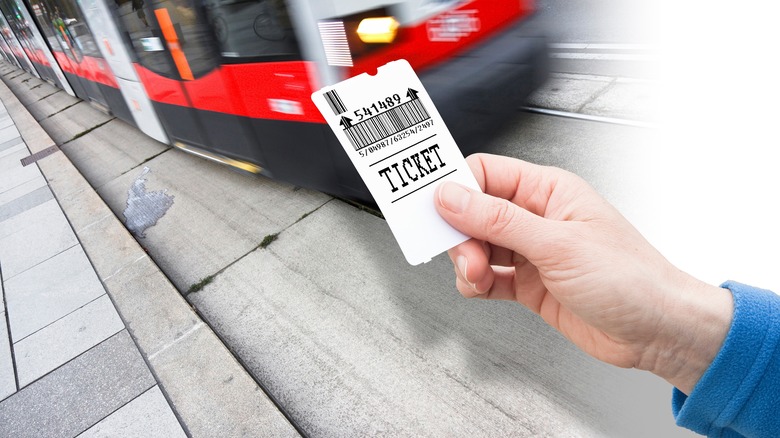
It is no secret that the sooner you book your train tickets, the better. But for those train passengers looking for the best prices, booking up to 11 months in advance, if possible, on Amtrak and then calling the company for a fare adjustment if prices drop is a little unknown money-saving hack. Similarly, advance ticket prices are more budget-friendly for train travel in most of Europe. Buying fares at least one to three months early (on special sale days) in places like France, the U.K., Germany, Spain, Italy, and Sweden is a great way to score more affordable tickets.
Besides purchasing your train fare well before your travel date, it is worth seeing what discount and rewards programs are also available. Amtrak has guest rewards, group discounts, and a handy AAA member discount that can save you at least 10%. There are several loyalty programs you can snag deals on, with Club Eurostar being one example that can help reduce the cost of train travel between London, Paris, Brussels, and Amsterdam. Even for other popular train journeys outside of the U.S. and Europe, purchasing a train ticket early as a rule of thumb is one of the best ways to keep costs down.
Buy the rail pass if you’re looking to keep costs down

Yet another train hack that keeps costs down is buying a rail pass if one is available. For example, the Amtrak USA Rail Pass and the Eurail Pass in Europe allow for multiple segment journeys or a total of so many rides. Amtrak’s USA Rail Pass typically offers 10 segments within 30 days. On the other hand, the Eurail Pass has many options, including passes that cover train travel through entire countries, specific areas, unlimited rides over several days or an entire month, and so on.
At a relatively affordable and fixed price, these passes are great for travelers who want to see as much of the US or Europe as possible. But that’s not all — these handy rail passes occasionally go on sale with savings of 15% off or more (sometimes even half the standard price for Amtrak). However, these incredible deals are often not broadcasted loudly. If you have some serious travel plans in the works and want to explore via train at a steal, pay attention to their promotional emails and website updates to share in the savings.
Pack only what you can comfortably carry
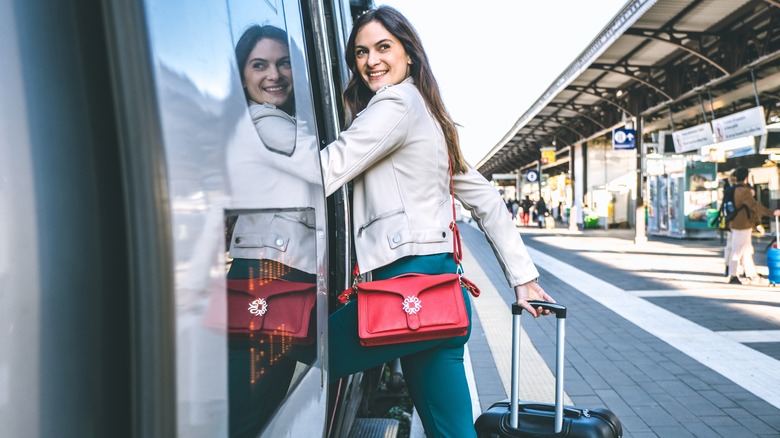
Damiano Buffo/Shutterstock
With less restrictive luggage rules than airports, it can be tempting to disregard the pack light mantra that seasoned travelers live by. This often leads to people thinking they can bring more stuff than they need on their rail getaway. But, when you need to run down a seemingly never-ending platform, drag all your baggage up several flights of stairs, or quickly gather your belongings so you do not miss your stop — packing light remains the best option.
Packing only the essentials makes getting through the train station easier, eliminates waiting around for your luggage, and allows you to go about your trip without your bags slowing you down. Plus, most trains limit passengers to two free carry-ons and two additional checked suitcases for a minimal fee. That said, it is worth noting that Eurail has a limit of three free carry-on bags. Of course, you could just do yourself a favor by packing light and keeping your baggage down to what you can comfortably carry.
Use a backpack for train travel
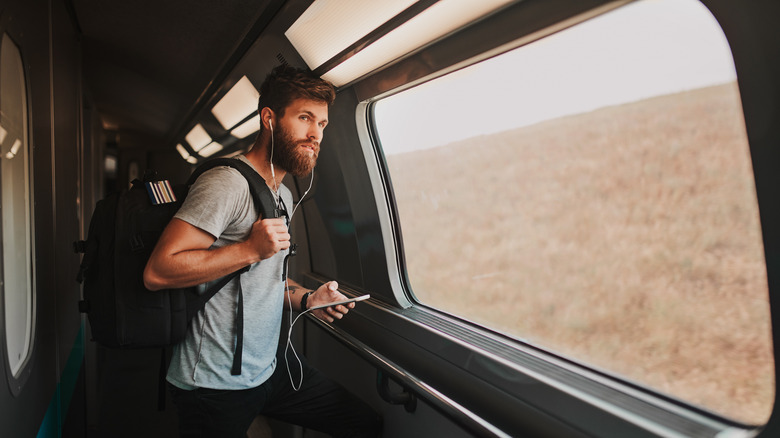
Adene Sanchez/Getty Images
Along those same lines, a backpack is one of the best choices for hurriedly carrying your belongings through a crowd. Even for extended train travel, opting for a backpack makes it easier to keep track of your stuff and allows quick access to anything you may need. When it comes to packing, keeping it light and rolling your clothes ensures you can fit in all your must-pack items for your train trip.
Taking a roller bag is another option for train passengers, but this kind of luggage tends to make your overall journey a little more difficult. Thus, backpacks with a 25-liter capacity for short getaways or a 45-liter capacity for a week or more are better choices. While packing your backpack, it is highly recommended that weight is distributed evenly and that you use smaller pockets for travel documents and toiletries. Alternatively, larger compartments should be saved for the bulky stuff and shoes, although footwear for a train trip should be limited to one or two pairs max. Travelers should also make it a point to adjust their straps to fit so that carrying a backpack is comfortable.
Grab the best seat using the apps
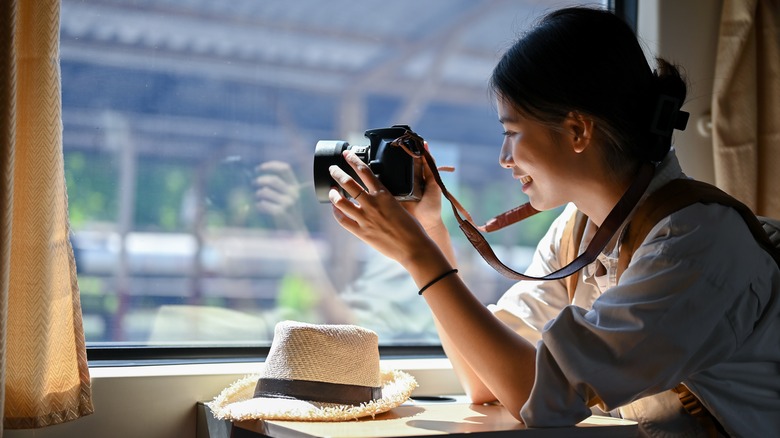
BongkarnGraphic/Shutterstock
There are many things to consider when choosing your reserved seats in advance. Knowing if you want to take photos, enjoy some peace and quiet, or have access to the wall outlet should be taken into account. But for those rides that are basically first come, first serve, it can be a mad dash to grab a good seat. New and infrequent rail riders are likely unaware of the countless apps that make finding the best seat or upgrading from coach a breeze. All it takes is a few taps on your phone.
SeatFrog, Realtime Trains, Momego, and many other apps track trains in real time, show platform numbers before they are shown on timetables, indicate seat availability, and much more. Utilizing these train tracking apps can streamline the boarding process and allow you to be one step ahead of the crowds. Of course, travelers should download the official app of the train operating company they are using for important travel info, but they should also check out some of the other lesser-known apps if they want to be one of the first people on the train or grab the best seat.
Get the lay of the land beforehand
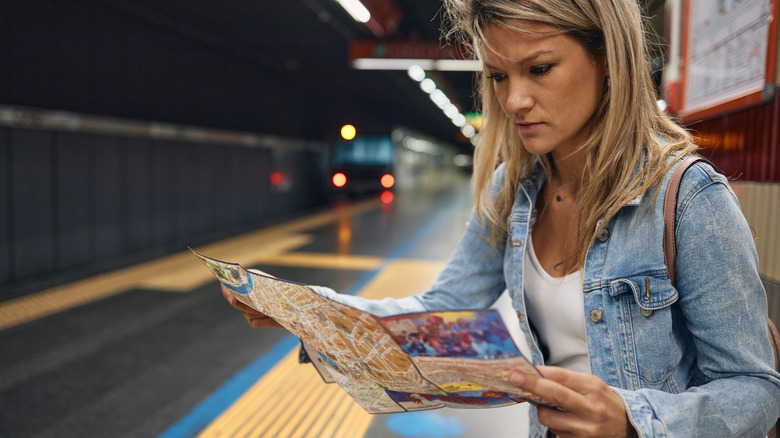
Sanyasm/Getty Images
Embarking on rail getaways involves some research ahead of time. However, most travelers do not take the time to familiarize themselves with their train route before they travel. It is in a traveler’s best interest to look into what the stations offer, where to park, the best way to get around the station, and other pertinent details about their pending train journey. Even taking the time to learn more about the various stops along your route, what train amenities are available, and what food is being served on board can make your trip more seamless.
Similarly, maps (online, offline, and in-app) can help you navigate the train station and new locations. Thus, getting the lay of the land beforehand can truly make all the difference on the day of travel. That said, it still does not hurt to ask for directions or ask the station staff where you need to go on the day of departure either — just make sure you have allowed for extra time if you do.
Utilize mobile hotspots instead of train’s Wi-Fi

Urbanscape/Shutterstock
Staring out of the window can be beautiful, but keeping yourself entertained during a long train journey or getaway can help break up the monotony of a lengthy ride. Therefore, it is common to see passengers hard at work, listening to a cherished playlist, watching episodes of their favorite TV shows, and more. Still, these entertainment sources often require internet access or a good connection. Thankfully, travelers will find free onboard Wi-Fi on select Amtrak trains and many passenger rails across the globe.
This complimentary connection, however, is not always the most reliable or the best option when riding the rails. In fact, it is highly recommended that train trippers use a mobile hotspot for a strong, fast, and reliable internet signal. For trains that happen to go through countless tunnels, underwater, or through areas with no cell towers (this is another reason to learn your route), taking the necessary steps to be able to work, watch your shows, or listen to your favorite tunes offline is definitely a smart move.
Go explore during long stopovers

Wundervisuals/Getty Images
If you know you will have a long stopover, who says you have to wait it out in the station? Why not explore the area around? In order to make the most of these waiting times, travelers should once again research their route to see if this is a stopover worth checking out or if there is a way to extend a part of their journey. Once you have identified a long stopover, look for nearby attractions, shopping centers, and places to grab some food.
Curious travelers should also take full advantage of these lengthy layovers and see more than just the pretty scenery. If there are museums close to the train station, bike rentals, or event popular events happening in the area, do not be afraid to check these things out — if you have the time, of course. Many train stations have lockers, so passengers can take a load off and store their bags while they immerse themselves in a nearby town.
Pack a light snack and extra hydration

Solstock/Getty Images
Snacks and extra water are musts when off on an extended rail adventure. Even if your journey includes meal service or your train has a dining car, it is still in your best interest to pack some extra food. More often than not, people think the goodies on board will get them through, but, instead, they end up hangry or dying of thirst. Thus, packing a light snack and extra hydration will ensure you do not have to wait around for the next scheduled service or search at random times for something to tie you over.
This is also a great way to ensure that your dietary restrictions are not an issue while forging for food. Snacks such as multigrain chips, small candy, crackers, protein bars, instant soup, or oatmeal (just ask for hot water during beverage service) are ideal for long trips. For shorter getaways, fruits, veggies, salads, and sandwiches are good options. It is also worth noting that if you bring a refillable water container, instead of a few bottles of water, you should use the designated filling fountain in the station rather than the train’s tap water.
Stretch your legs when you can

BublikHaus/Shutterstock
Traveling can take a lot out of you, whether via plane, bus, or train. Spending hours on board seated, no matter the mode of public transportation, can take a toll on your body. To avoid feeling stiff or sore, rail passengers should make it a point to stretch their legs when possible. In fact, getting up to walk around at least every 10 to 30 minutes or so will do wonders for your muscles and prevent the slowing of blood circulation.
Other onboard exercise hacks like contracting and relaxing your leg muscles, performing seated exercises (ankle, foot, and so on), stretching your arms, and doing some neck rotations can help you maintain good mobility. Getting some fresh air and going for a brisk walk before departing the train station and after arriving at your intended destination will help keep the momentum going. Even on train rides that are only a few hours long, it is highly recommended that passengers roam about every so often to make the physical stress of traveling a little more manageable.
Opt for a room on board

Flystock/Shutterstock
For travelers heading off on a long journey, booking coach or a comfortable seat might seem like the most sensible option, especially when it comes to affordability. However, if you are going on an overnight or multi-segment escape, why not consider a roomette or a bedroom suite? Not only do you get more amenities on board and additional space to spread out, but you also do not have to worry about booking separate accommodations and can rest up while you travel.
Opting for either option onboard definitely has its perks. All meals are included, some bedrooms have a private bathroom plus shower, and roomette passengers can access shared showers. When you book a roomette or bedroom, you also often have designated concierges, room attendants, and rail specialists to help ensure you have a fabulous experience every step of the way. These passengers even have their own lounge area in many train stations. Of course, you can always pack a bedsheet, blanket, noise-canceling headphones, and sleeping mask if you prefer to keep the cost low by reserving a seat elsewhere on the train. However, if you can swing it and it is within your budget, book a roomette or bedroom suite.
Double-check train timetables even when using apps
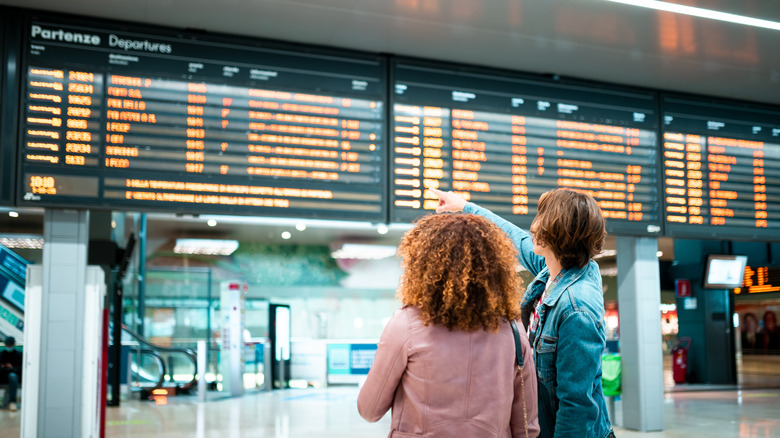
Mstudioimages/Getty Images
Train travel apps are undoubtedly useful and help keep your rail adventure more structured. With all the available apps, you may think you are on top of schedule changes, delays, and platform numbers. But things change, and often — sometimes, the apps are not immediately updated. Just like any other kind of technology, issues can arise — your phone may need to be recharged at inconvenient times, your customized online timetable might have the wrong info, and some third-party apps have a habit of being unreliable.
If you have multiple apps on your phone, all the notifications, updates, and competing information can make things a little confusing when you are in a hurry. To avoid missing your train, heading to the wrong platform, or accidentally stressing yourself out, take the extra five seconds and double-check the train timetables. A quick glance at any of the multiple timetables in the station can save you from a world of frustration.
Use red cap service when on Amtrak
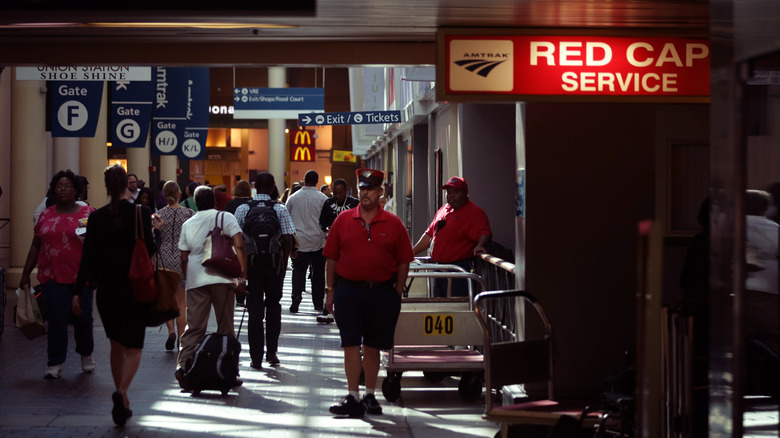
Alex Wong/Getty Images
Using the Red Cap baggage-handling service when traveling via Amtrak is also a lesser-known hack that removes much of the guesswork in busier train stations. Personalized assistance that helps with navigating the stations, answering any questions you may have, and carrying your luggage comes in handy in a pinch. Unfortunately, only a handful of other train operating companies in Europe and the rest of the world offer comparable services to Amtrak’s Red Cap baggage-handling service.
If you are planning an adventure in the U.S., remember the Red Cap service can make the start of your train journey effortless — just look for the staff with the red caps. Ultimately, there are an assortment of travel tips and tricks that can upgrade your overall rail experience in just about any country. Whether you incorporate all these little-known hacks for train travel or just some, you will be amazed at how much more refined traveling by train can be and how, with only a few tweaks, you can fully transform your rail journey from beginning to end.

